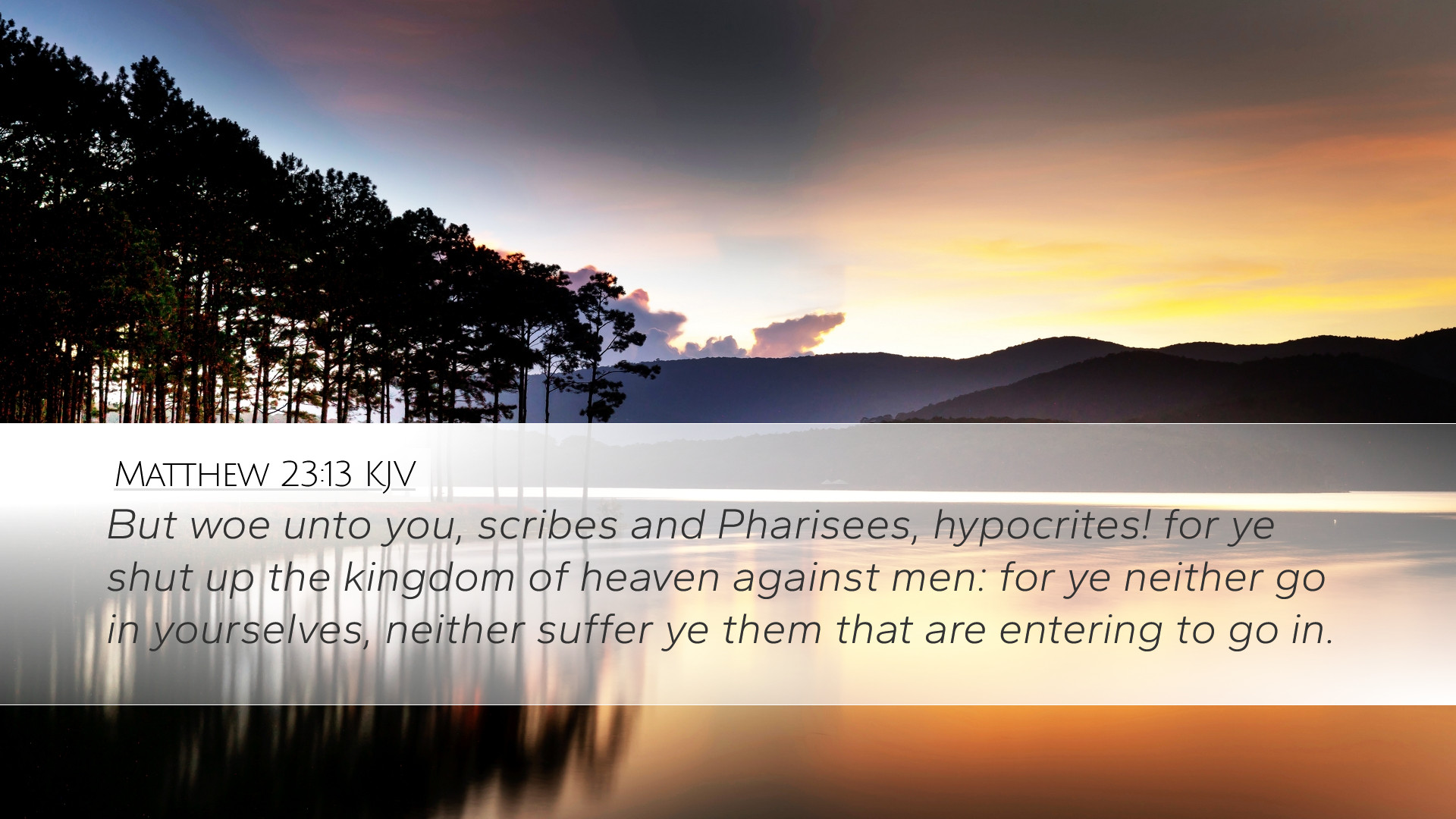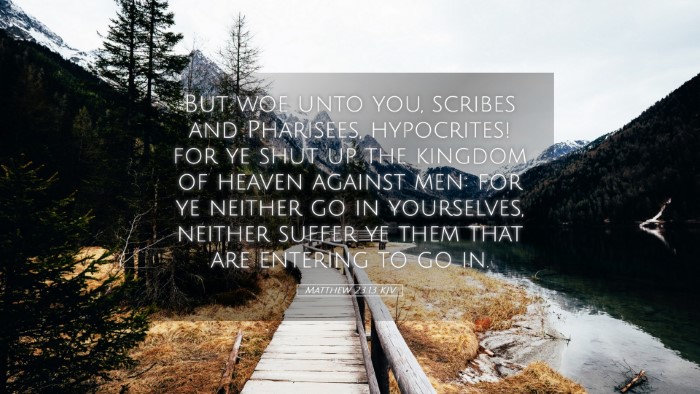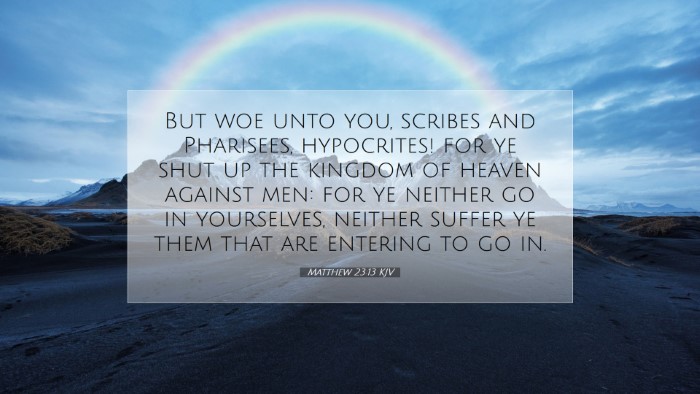Commentary on Matthew 23:13
Verse Text: "But woe to you, scribes and Pharisees, hypocrites! For you shut the kingdom of heaven in people's faces. For you neither enter yourselves nor allow those who would enter to go in."
Introduction
This verse occurs within a series of rebukes that Jesus levels against the religious leaders of His day, specifically the scribes and Pharisees. The context of Matthew 23 is a public declaration of the hypocrisy pervading the Jewish religious leadership. Here, Jesus employs strong language to expose their spiritual blindness and the consequences of their actions on others.
Overview of Public Domain Commentaries
Various commentaries from notable theologians such as Matthew Henry, Albert Barnes, and Adam Clarke provide deeper insights into this verse, illuminating its significance in the broader narrative of Jesus’ ministry and the implications for faith and practice today.
Matthew Henry's Commentary
Matthew Henry emphasizes the harshness of the woe pronounced upon the scribes and Pharisees. He notes that:
- Hypocrisy Defined: Henry points out that hypocrisy is a severe sin that leads to the closing of the heavens to others. The Pharisees, while appearing devout, were masking their true intentions.
- Obstruction of True Worship: He describes how their teachings and legalism created barriers that prevented genuine seekers from approaching God. This described a failure of leadership that was intended to guide the people into truth.
- Consequences of Their Actions: Henry underlines that because they did not enter the kingdom themselves, they denied others the opportunity, emphasizing the relational aspect of spiritual leadership.
Albert Barnes' Notes
Albert Barnes provides a more technical analysis of the verse, focusing on the implications of Jesus’ accusation:
- Shutting the Kingdom: Barnes explains that the phrase "shut the kingdom of heaven" refers to a deliberate obstruction. The Pharisees enforced a system of works that contradicted Christ’s message of grace.
- Responsibility of Teachers: Barnes points out the significant responsibility that comes with being a teacher in the kingdom. There is an expectation that leaders not only know the truth but actively lead others into it.
- Spiritual Accessibility: He stresses that the Kingdom of God is accessible and that these leaders had created unnecessary barriers, thus distorting the truth of God’s salvific grace.
Adam Clarke's Commentary
Adam Clarke examines the socio-religious context of the time, offering insights into the Pharisaical practices:
- Religious Structure: Clarke identifies the role of the Pharisees and their intricate system of laws that they HAD established to maintain control over worship and faith. He argues that this system was not only burdensome but also misrepresented the nature of God.
- Legacy of Hypocrisy: He suggests that the hypocrisy of the Pharisees created a legacy that still affects religious practice. This highlights the timeless nature of Jesus’ rebuke—applicable to any generation.
- Call to Integrity: Clarke encourages modern readers to pursue integrity in their spiritual lives, warning against the same pitfalls of hypocrisy seen in the Pharisean model.
Theological Implications
From the insights gathered, several key theological implications emerge from Matthew 23:13:
- Judgment on Hypocrisy: Each commentator agrees on the seriousness of hypocrisy in spiritual leadership. This serves as a cautionary tale for current and future leaders to lead by example.
- Grace vs. Legalism: The passage underscores the critical tension between grace and legalism, urging believers to embrace the transformative power of grace that is available through Christ.
- The Role of Teachers: It reinforces the call for those in teaching roles to genuinely embody the message of the Gospel, recognizing the significant impact they can have on others’ spiritual journeys.
Practical Applications
For pastors, theologians, and students alike, the exploration of Matthew 23:13 can be applied in various practical aspects:
- Self-Reflection: Leaders should regularly engage in self-reflection to ensure that their lives align with the messages they preach.
- Teaching with Integrity: There is a call to prioritize authenticity in teaching, making sure that the teachings do not impose unnecessary burdens on the congregation.
- Encouragement of Others: Encourage a culture within the church that welcomes seekers and those new to faith, ensuring that the gates of heaven remain open and inviting.
Conclusion
Matthew 23:13 serves as a poignant reminder of the dangers of hypocrisy and the vital importance of spiritual leadership. By synthesizing insights from Matthew Henry, Albert Barnes, and Adam Clarke, we reflect on the profound need for authentic faith that aligns with our teachings and actions. Believers are called to enter the kingdom of heaven sincerely, ensuring that they also assist others on their journey toward the heart of God.


